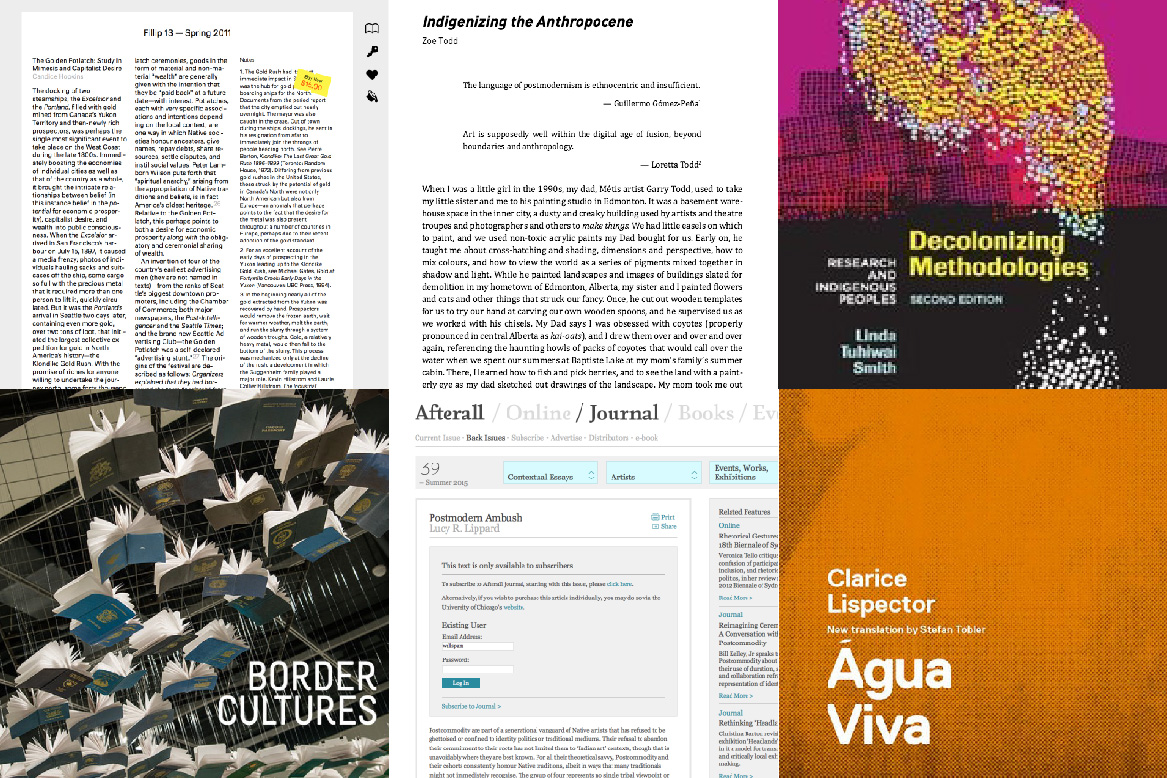
08.03.16 - #ReadingList: 4 essays and 2 books on colonialism and sovereignty
Every year, artists, curators, theorists and visual communicators speak at the Daniels Faculty as part of the Master of Visual Studies (MVS) Proseminar Series. Assistant Professor Charles Stankievech, Director of the Faculty’s Visual Studies Program, organizes the lineup of speakers for the winter semester. This year’s theme revolves around the idea of colonialism and sovereignty.
Zoe Todd, an anthropologist who studies human-animal relations, colonialism and environmental change in northern Canada, will present the next lecture in the series on Monday, March 14, 2016.
We asked Charles to compile a list of readings he thinks would complement, and expand upon, this year’s MVS Proseminar Series theme. Here are his picks:
This year, the 2016 Winter MVS Proseminar Series focuses on the potentials and problematics of Sovereignty and Colonization: both internationally and locally. The talks range from questions of decolonization through independence to the politics of monuments. Questions of exhibition display are intertwined with expanded notions of agency that include the post-human. The following list of readings is a sample of the amazing writings by our visiting lecturers and ally theorists.
1. “The Golden Potlatch: Study in Mimesis and Capitalist Desire” by Candice Hopkins
Candice presented the second talk in the series on February 10, 2016. The lecture, entitled “They paid their sentences with the removal of their feet: An indigenous response to conquistador monuments and the conquest of New Spain,” addressed the defacement of colonial monuments as an intervention into the status quo of suppressing our violent histories. Watch the entire lecture on the Daniels Faculty Youtube channel.
Her essay, “The Golden Potlatch: Study in Mimesis and Capitalist Desire” — examining potlatch, capitalistic economy and the public festival — is a good primer to her contemporary research into the politics of non-western display of art and artifacts.
2. “Indigenizing the Anthropocene” by Zoe Todd
(Page 255 in the book Art and the Anthropocene: Encounters Among Aesthetics, Politics, Environments and Epistemologies)
Zoe Todd will present the third lecture in the series, “Fish pluralities, refraction and decolonization in amiskwaciwâskahikan” on Monday, March 14, 2016. She is an anthropologist researching fish, colonialism and legal-governance relations between Indigenous peoples and the Canadian government.
She wrote an interesting essay last year that has been making the rounds called “Indigenizing the Anthropocene”, which in a way complicates an excellent earlier online text “An Indigenous Feminist’s take on the Ontological Turn: ‘ontology’ is just another word for colonialism.”
3. Decolonizing Methodologies: Research and Indigenous Peoples by Linda Tuhiwai Smith
Linda’s book, Decolonizing Methodologies: Research and Indigenous Peoples, is required reading in all of the classes I teach at the University of Toronto. Until we make a course on Indigenous Studies mandatory at the school, this is a good place to start. Even just reading the introduction is an important first step to acknowledge the bias built into our current knowledge production methodologies.
4. “Crossing the Shatter Zone” by Bonnie Devine
(Essay in the book Border Cultures, available at the Art Gallery of Windsor)
Local artist and educator Bonnie Devine actually recommended Linda Tuhiwai Smith’s book to me. Bonnie wrote a great experimental text this past year that tells the history of the Great Lakes titled “Crossing the Shatter Zone.”
“Crossing the Shatter Zone” was included in the exhibition catalogue Border Cultures, which had its launch as part of our Fall Proseminar series with curator Srimoyee Mitra. The catalogue features the work of the many artists and authors who participated in a three-part exhibition at the Art Gallery of Windsor.
The AGW currently has an amazing exhibition by Wafaa Bilal reflecting on the destroyed library at the University of Baghdad.
5. “Postmodern Ambush” by Lucy R. Lippard
Lucy R. Lippard has been a long-standing key figure in feminist art. Her recent shift from valuing Land Art — which made her famous in the 1960s — toward the politics of Land Use is an important temperature gauge of the urgency of the times.
She wrote a great essay last year about the collective PostCommodity in Afterall Journal. In Lippard’s words, PostCommodity are “part of a generational vanguard of Native artists that has refused to be ghettoised or confined to identity politics or traditional mediums.”
(Full disclosure: Starting in April, Afterall will be co-published by the Daniels Faculty)
You can buy Afterall at my favorite bookstore in Toronto, Type, or you can download the essay via your academic account.
6. Água Viva by Clarice Lispector
Clarice’s Água Viva is another one of those books that somehow slips into every reading list that I pull together. She replaced Pynchon as my Muse years ago and I can’t say much other than just read her. Água Viva, while one of her more unknown books, captivated me on the first page and I keep reading it like a Book of Hours: “These instants passing through the air I breathe: in fireworks they explode silently in space.”
Água Viva is published in English by New Directions Press. Type usually has a few in stock as not a week or so goes by without me recommending or giving the book to someone.
More #ReadingLists:







